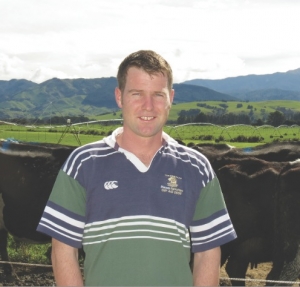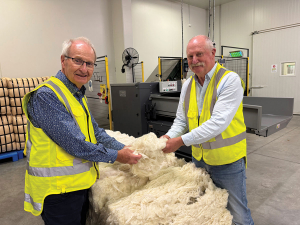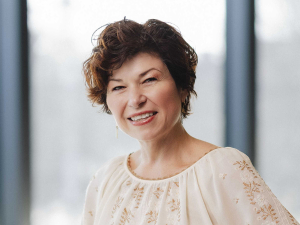It happened in the 2008-09 season during a bad drought in Wairarapa plus repeated drops in forecast payout. Stolte and his wife Elise, facing potential losses, quickly decided to cut costs; that philosophy has been a key driver to being successful dairy farmers – including winning the Hawkes Bay/Wairarapa Sharemilker of the Year award in 2010.
“That near-crisis taught us quickly in a our first year as share milkers how to cut our costs and we’ve never looked back. We managed to make money in that environment and we knew if we could do it then, when it was very challenging, we could certainly make money in better times. That became our driver and so the whole farm’s cost of production dropped right back to sit around $3 [per kgMS] whereas in previous years we tended to be sitting over $4.”
The Stoltes are 50/50 share milkers on his father’s property about 5km south of Masterton. It’s close to the Waingawa River so the soil is fine river silt and free draining and doesn’t hold the moisture easily. The stones in the paddocks make putting in even a simple strainer quite an exercise. A crow bar is an essential tool on this farm. In summer the stones heat up during the day and Stolte describes it like farming on ‘a big hangi’.
The so-called ‘big hangi’ is made up of 165ha, of which 85ha is irrigated. They run 500 Friesian cows and this year are targeting 225,000kgMS – a significant lift from the 168,000kgMS coming off the farm when he took over in 2007.
The son of a Dutch immigrant, Stolte did a Diploma in Agriculture at Massey University when he left school and worked as a farm assistant and then a herd manager. “Then the equity manager left here and it was wide open. I never expected to come back on this farm to be honest. I thought I’d probably go down to Canterbury. But I have never looked back and the position we have put ourselves in here is pretty good.”
In 2007 they were lower order then moved up to 50/50 in the 2010-11 season. Besides doing well himself as a share milker, Clarence is conscious of the need to ensure the owner, in this case his father, is also well rewarded – another of his drivers.
For him, irrigation has made a big difference. Part of the farm has always been irrigated but over time the area has been increased from 65ha to 85ha and a new centre pivot system installed. Interestingly, while the area on the farm now being irrigated has increased, their consented water take is the same as always. “But we have been able to stretch that water further through the centre pivot system and have used that water more efficiently to enable us to cover a bigger area,” he says.
Currently the Greater Wellington Regional Council is investigating the possibility of developing a major irrigation scheme in the Wairarapa. Stolte says such a scheme has the potential to bring more land into dairying, but the scheme is still years away even if it gets the go-ahead.
The lessons learned early in Stolte’s dairy farming career still hold firm and have shaped his whole farm management philosophy.
Essentially it comes down to having control over the farm and not having to rely on outside influences which could change the cost structure of the property.
“We would be a system two or three and just feed supplements in the shoulders of the season. We have our own run-offs and take some grass silage off them but we don’t normally use PKE. The idea is to be as self contained as possible. Having full control gives greater flexibility.
“We can control the quality of the grass and the quality of the feed we make. We can control the costs so that we know that every year we are willing to put in so much for, say, labour and anything we can quantify and we can set a budget around that. Whereas if we are sending stock away we don’t have control over the quality of what happens; and if you buy feed in you don’t have control over the quality or the price. The whole system is geared towards profitability.”
















